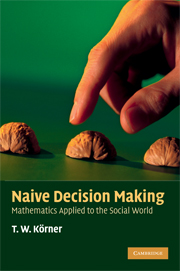Book contents
- Frontmatter
- Contents
- Introduction
- 1 A day at the races
- 2 The long run
- 3 The vice of gambling and the virtue of insurance
- 4 Passing the time
- 5 A pack of cards
- 6 Other people
- 7 Simple games
- 8 Points of agreement
- 9 Long duels
- 10 A night at the casino
- 11 Prophecy
- 12 Final reflections
- Appendix A The logarithm
- Appendix B Cardano
- Appendix C Huygens's problems
- Appendix D Hints on pronunciation
- Bibliography
- Index
7 - Simple games
Published online by Cambridge University Press: 06 July 2010
- Frontmatter
- Contents
- Introduction
- 1 A day at the races
- 2 The long run
- 3 The vice of gambling and the virtue of insurance
- 4 Passing the time
- 5 A pack of cards
- 6 Other people
- 7 Simple games
- 8 Points of agreement
- 9 Long duels
- 10 A night at the casino
- 11 Prophecy
- 12 Final reflections
- Appendix A The logarithm
- Appendix B Cardano
- Appendix C Huygens's problems
- Appendix D Hints on pronunciation
- Bibliography
- Index
Summary
Scissors, Paper, Stone
In the previous chapter we recalled the game of Scissors, Paper, Stone. In it, the two players simultaneously put out their right hands, two extended fingers represent scissors, an open hand paper, and a clenched first stone. Scissors cut paper, paper wraps stone and stone blunts scissors.
How should we play this game? The answer depends on our opponent. If our opponent is a small child we may observe that it never uses stone or that it never repeats the weapon it used in the previous round. You can use this information to ensure that you win more times than you lose.
Exercise 7.1.1Explain why, if you know that your opponent will choose from two specified weapons, you can arrange so that you never lose and sometimes win.
It is more interesting to consider what we should do if faced by an opponent cleverer than ourselves. Whatever plans we make, we must expect them to be anticipated. Under these circumstances, it makes sense to play at random, choosing each weapon with probability 1/3 independent of what has gone before. (We could, for example, throw a die and play scissors if the die shows 1 or 2, paper if the die shows 3 or 4 and stone if the die shows 5 or 6.) If our opponent plays stone, then with probability 1/3 we play scissors and lose, with probability 1/3 we play paper and win and with probability 1/3 we play stone and draw.
- Type
- Chapter
- Information
- Naive Decision MakingMathematics Applied to the Social World, pp. 195 - 220Publisher: Cambridge University PressPrint publication year: 2008



